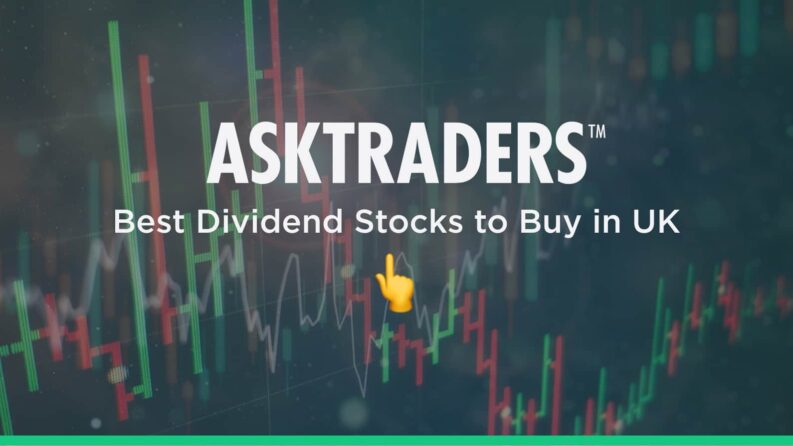Dividend stocks are a great way to generate passive income and grow your wealth over time. In addition, they help investors diversify their portfolios and reduce the overall risk. When you buy a dividend stock, you are buying a piece of a company that pays out a portion of its profits to shareholders on a regular basis, providing you with a second source of return on your investment.

YOUR CAPITAL IS AT RISK
When choosing dividend stocks, it is important to consider a number of factors, such as the company's financial health, dividend history, and future growth prospects. Here are the five of the best dividend stocks to buy in the UK:
| Company Name | Industry | Dividend Yield | EPS (2022) | P/E Ratio |
|---|---|---|---|---|
| M&G PLC | Financials | 9.93% | (66p) | – |
| Imperial Brands | Tobacco | 8.03% | 265.2p | 10.01 |
| Aviva | Financials | 7.93% | (38.2p) | – |
| British American Tobacco | Tobacco | 9.24% | 291.9p | 6.34 |
| Vodafone | Telecommunications | 10.29% | (2023) (€ cents) 42.77 | 2.06 |
How We Chose These Stocks
Our top five UK dividend stocks were chosen due to their solid financial health, which means that they are able to generate consistent profits and pay out dividends to shareholders. In addition, we have chosen companies that have a dividend yield of 7% and above, with some nearer the 10% mark. Furthermore, they have solid Fitch investment-grade credit ratings (BBB and above). All of the companies have a long track record of paying dividends to shareholders, meaning they are committed to returning value to investors.
M&G PLC (LON: MNG)
London-based investment management company M&G uses its cash pile to invest in equities, property, and bonds. For more than 80 years, it has been making shrewd decisions in relatively safe assets and giving cash returns to its shareholders.
The company was only listed on the London Stock Exchange (LSE) in 2019 when it was spun out of insurance group Prudential. However, it has already been marked as one of the highest-dividend-paying stocks in the UK.
IMPERIAL BRANDS PLC (LON: IMB)
Imperial Brands, formerly known as Imperial Tobacco, is a UK-based FTSE 100 tobacco and cigarette manufacturer. It has a long track record of returning cash to investors and is considered one of the best dividend stocks in the FTSE 100.
Expanding market share in tobacco products is politically sensitive nowadays. Without the need to invest in new projects, the firm focuses on operational efficiency, and this means that significant profits are returned to shareholders.
The enduring appeal of the super-reliable IMB dividend means that many buy-and-hold investors step in to buy the stock whenever it appears undervalued. This can result in capital gains as well as income returns.
AVIVA PLC (LON: AV)
Aviva is a leading insurance, wealth management, and retirement company that has millions of customers worldwide and, for some time, has been one of the top UK dividend stocks.
Since July 2020, the company has cut costs and focused its attention on the UK, Ireland, and Canada markets, and it looks as though the benefits of that shake-up are feeding through.
Aviva's strong dividend track record is supported by its financial performance over the years. The company has a diversified business model, with operations in life insurance, general insurance, wealth management, and retirement, giving it some protection from economic downturn.
British American Tobacco PLC (LON: BATS)
British American Tobacco (BAT) is a London-listed tobacco company. It sells five main categories of products: Vapour, Heated Tobacco, Modern Oral, Traditional Oral, and combustible cigarettes. The company, established in 1902, is headquartered in London, England. Given the shift away from cigarettes, BAT is investing heavily in new products, such as e-cigarettes.
The company has a long history of paying dividends to shareholders and is considered to be one of the top UK dividend stocks. It also has a track record of progressive dividend growth, supported by its robust financial performance.
VODAFONE GROUP PLC (LON: VOD)
Vodafone is the fourth-largest mobile operator in the world and has almost half a billion customers. It’s one of the largest companies in the FTSE 100. While always on the lookout for expanding market share, it has no issues with returning spare cash to shareholders rather than leaving it sitting on the balance sheet.
It’s some years since Vodafone was considered an exciting way to tap into a growth sector. Technological advances in other areas mean that its current business model is closer to that of a utility company.
YOUR CAPITAL IS AT RISK
WHY INVEST IN DIVIDEND STOCKS?
While all investment is inherently risky, taking positions in high-dividend stocks can scale back the risk-return ratio. The dividend stocks highlighted are all large-cap firms. They have the critical mass to see them through economic downturns and consistent revenue streams.
Global pandemics and economic recessions can cause some businesses to struggle. However, while consumer discretionary stocks might suffer, Vodafone’s phone contracts and Aviva’s home insurance policies are likely to be one of the last costs to be cut from a household budget.
Flipping things around and considering market sell-offs, it’s possible to claim pullbacks in the stock market can be good news for high-yield stock investors. This allows them to get in at rock-bottom prices and hopefully secure a higher dividend yield.
WHAT TO KNOW BEFORE INVESTING IN UK DIVIDEND STOCKS
It’s possible to make substantial profits from high-dividend stocks, but there are some potential downsides.
Opportunity cost – You are forsaking the chance of catching the next Amazon or Google (Alphabet) stock. These two firms have never paid a dividend and instead invest their spare cash back into the business. This approach marks them out as growth stocks and can result in the share price soaring far higher than it ever will with a dividend stock.
You can never get away from downside risk – While high-yield stocks are largely insulated from economic downturns, they aren’t immune. The unprecedented events over the last few years have significantly impacted some companies, regardless of whether they pay dividends.
You still need to optimise your trade entry point – Dividend yield depends on what price you buy at. The dividend paid to shareholders is paid according to the number of shares you hold. If you buy into a stock at a price twice that of your neighbour, then their dividend yield will be twice what yours is.
Dividend dates – Dividends are paid on certain dates, and getting to grips with some of the terminology can be useful. This report can help you do that. The good news is that dividends tend to be ‘priced into’ the share price, so if you sell before the dividend ex-date, you shouldn’t lose out disproportionally. However, it is something to be aware of.









